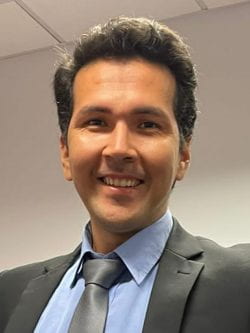
Power Electronics and Applications Research Lab
LAB DIRECTOR

Prof. Josep Pou
S2-B2a-06
Nanyang Technological University,
School of Electrical and Electronic Engineering,
50 Nanyang Avenue, Singapore 639798
Email: j.pou@ntu.edu.sg
Biography:
Josep Pou received the B.S., M.S., and Ph.D. degrees in electrical engineering from the Technical University of Catalonia (UPC)-Barcelona Tech. He was the top student in the Bachelor graduating class, received the Master Degree with first-class honours, and was awarded the Extraordinary Ph.D. Thesis Award at UPC.
In 1990, he joined the faculty of UPC as an Assistant Professor, where he became an Associate Professor in 1993. From 2003 to 2007, he was Director of the Power Quality and Renewable Energy (QuPER) group, and from 2007 to 2013 he was Director of the Terrassa Industrial Electronics Group (TIEG), both research groups at UPC. From February 2013 to August 2016, he was a Full Professor with the University of New South Wales (UNSW), Sydney, Australia. In UNSW, he was technical research stream leader for the Solar Flagships Program Research Agenda, the result of AU$19-million investment from the Commonwealth Government of Australia in world class laboratories developed to study solar power conversion and its impact on the grid. He is currently a Professor with the Nanyang Technological University (NTU), Singapore, where he is Program Director of Renewables’ Integration and Microgrids (Power Electronics) at the Energy Research Institute at NTU (ERI@N), and Director of the Power Electronics and Applications Research Lab at NTU (PEARL@NTU). He is also co-Director of the Rolls-Royce @ NTU corporate lab, a SG$88-million investment from IAF, Rolls-Royce and NTU to perform research on future transportation and other research topics of interest to Rolls-Royce. As part of the Rolls-Royce @ NTU corporate lab, he is co-Director of the Power Systems Integration Lab at NTU (EPSIL@N) with focus on more electrical aircraft (MEA) and hybrid propulsion developments.
He spent two sabbatical years (2001 and 2005) as a Visiting Professor at the Center for Power Electronics Systems, Virginia Tech, USA, and one year (2012) at the Australian Energy Research Institute (AERI), UNSW, Sydney. He has authored over 360 published technical papers, is a co-inventor of 7 patents, and has been involved in several industrial projects and educational programs in the fields of power electronics and systems. He has authored two book chapters. He has received 6 scholarship and fellowship awards, including the prestigious Endeavour Research Fellowship Award, sponsored by the Australian Government.
He is IEEE Fellow. Since 2016, he has been Associate Editor of the IEEE Journal of Emerging and Selected Topics in Power Electronics. He was co-Editor-in-Chief of the IEEE Transactions on Industrial Electronics (2018-2020), and Associate Editor of the IEEE Transactions on Industrial Electronics (2014-2018). He was Invited Editor of the Special Section on “Modular Multilevel Converters” for the IEEE Transactions on Industrial Electronics, and Invited Editor of the Special Section on “Hybrid Multilevel Converters” for the IET Power Electronics.
He was the recipient of the 2018 IEEE Bimal Bose Award for Industrial Electronics Applications in Energy Systems given by the IEEE Industrial Electronics Society. In 2019, he received a Recognition Award for Outstanding Contribution as co-Editor-in-Chief of the IEEE Transaction on Industrial Electronics.
LAB CO-DIRECTOR

Biography:
Glen G. Farivar (Senior Member, IEEE) received the B.Sc. degree in electrical engineering from Nooshirvani Institute of Technology, Babol, Iran, in 2008, the M.Sc degree in power electronics from the University of Tehran, Tehran, Iran in 2011, and PhD in electrical engineering from the University of NSW Australia, Syndey, Australia in 2016. He is currently working as a post-doctoral research fellow at the Energy Research Institute, Nanyang Technological Institute (ERI@N), Singapore. His research interests include renewable energy systems, high power convertors, energy storage, FACTS devices, and hybrid electric vehicles.